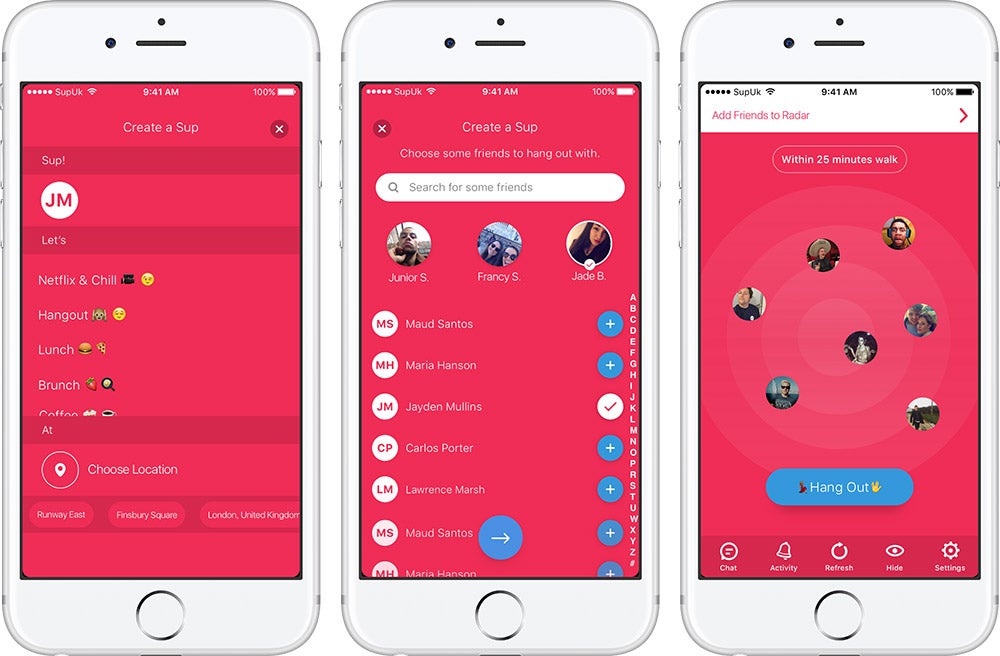After Flying 74 Times in One Year, This Entrepreneur Developed an App to Make Traveling Less Lonely For our '20 Questions' series, the founder of friend-finder app Sup talks to us about how his mission differs from other social networks, what he does to stay productive and how Google spreadsheets is a life saver.
Opinions expressed by Entrepreneur contributors are their own.

Editor's Note: Entrepreneur's "20 Questions" series features both established and up-and-coming entrepreneurs and asks them a number of questions about what makes them tick, their everyday success strategies and advice for aspiring founders.
Traveling all over the world may seem like a glamorous dream come true. But the shimmer of exotic cities can dim pretty quickly if on your own. There's no one to share a bite of a delicious dish, smile with you at the end of a hiking excursion or keep you company during a plane delay.
Richard Pleeth feels your pain.
Having previously worked at Google and New York City car app Gett, Pleeth racked up his frequent flyer miles globetrotting all over the world. In 2014 alone, he took 74 flights. To try and connect with his friends, he would continually check in on Facebook in hopes of meeting up with them. But there was always a one or two day delay in between, even when he was home in London.
Related: The CEO of Billion-Dollar Startup Gusto Believes Passion Should Come Before Revenue
To help remedy the problem, Pleeth created an app called Sup to help folks more easily connect and meet up with friends (without the creep stalker factor that some other apps may secrete.) Sup connects to social media and simply sends a quick notification when friends are nearby -- about a five, 15 or 25 minute walk away. You have the option to reach out if you feel like meeting up and even send out a notification if you're lonely and fancy a friend or two.
"We all use a bunch of social networks, but they all make us less social," Pleeth says. "We spend more time looking at our screens, adding filters to photos or looking through newsfeeds, rather than being out meeting our friends."
Having just launched in November, the app -- with a focus more on the in-person connection, rather than online -- has already snagged $1 million in funding and has more than 50,000 users.
We reached out to the app's founder to check out how this entrepreneur gets through the day and advice he has for others.
1. How do you start your day?
I reach for my phone to see what I missed while I was asleep. I check all the news sites, my social feeds and do as many emails as possible while in bed. I find this means I'm fully informed for the day and helps me relax a little before having to get up. Then it's up to the shower where I have some time to think about everything I have just taken in and wake up properly before heading to my first meetings.
2. How do you end your day?
I have a lot of events to attend in the evenings, so the timing of the end of my day varies. It's super important to attend as many as possible to really get out and network, meet investors and press.
I also call my 97-year-old grandma each evening to check how her day was as she likes to hear me from me. Lastly, I finish all my emails, I try and operate inbox zero, which I think is a really healthy way to work. I then usually get into bed with my phone to read some blogs and have a catch up with friends.
3. What's a book that changed your mind and why?
Purple Cow by Seth Godin. He makes you think, take a step back and see how you can make your product stand out -- make it something people want to talk about and have in their lives.
4. What's a book you always recommend and why?
How Google Works by Eric Schmidt and Jonathan Rosenberg. They really hit the points home here on how Google has become the most valuable company in the world. It's really useful understanding how to innovate, stay nimble and build a winning team.
5. What's a strategy to keep focused?
I have a very clear to-do list each day. I call it my "Master Sheet," and it's a Google spreadsheet with columns for today, this week, next week, this month, along with ongoing and separate columns for other issues such as PR and fundraising. I make sure I know exactly what I have to do each day and ensure I can cross each one off, so nothing gets dropped.
Related: How to Stay Focused: Train Your Brain
6. When you were a kid what did you want to be when you grew up?
A lifeguard, just like in Baywatch. I loved swimming and the beach, so I related to that a lot. I was intrigued by the independence of being a lifeguard and having flexibility while having a lot of fun. Also who doesn't want to be a hero?
7. What did you learn from the worst boss you ever had?
You need to encourage your team, never take credit for other individuals work, be consistent and take responsibility for your decisions.
8. Who has influenced you most when it comes to how you approach your work?
It's not really one person, but it's the people I worked with at Google. I learned so much and came to admire so many people at the company who are among the most ambitious, intelligent and personable people I have ever met.
9. What's a trip that changed you?
In 2013 I travelled to North Korea for four days, and it was fascinating. I'm passionate about everyone having access to unmoderated internet and access to information. North Korea is so far away from that, and it really made me think the whole time I was there. Now three years later, I think back to the people I met, the questions they asked and how their lives would be so much better with access to information.
10. What inspires you?
People being better than me at everything. There are a lot of them. I'm not particularly good at anything, I'm just immensely curious about everything I come in contact with.
11. What was your first business idea and what did you do with it?
I sold shells I found on the beach to my family. The margins were phenomenal, but it didn't really lead to great lengths.
12. What was an early job that taught you something important or useful?
I was a sailing instructor while at school. It was fun, but it really taught me how to lead the other sailing instructors, teach all the students and ensure everyone was having fun, safe and learning to sail.
13. What's the best advice you ever took?
Never stop learning.
14. What's the worst piece of advice you ever got?
Give up.
Related:
15. What's a productivity tip you swear by?
Put everything in your calendar -- personal stuff, work stuff -- so the time when you are free, your team can book or put in meetings. Then be super disciplined with meetings. Make sure you are achieving a goal.
16. Is there an app or tool you use in a surprising way to get things done or stay on track?
I use Google Spreadsheets as my to-do list. I find it's super effective as you can login from anywhere and it's all synced. I can move items from today, to this week, to next week, and I can track exactly what I need to do.
I also obviously use my calendar to track everything. Google Calendar is brilliant and syncs with my emails and browser so I can ensure that I am where I need to be.
17. What does work-life balance mean to you?
As a founder you are always on. I try and reply to all emails immediately to let people know I am on it and will get back to them with more detail later. I think it's important to have a lot of fun in what you do professionally. Outside of work I have the most fantastic friends, who I spend a lot of time with and are there to support me. We have a good party, which balances out the intense work.
18. How do you prevent burnout?
I love what I do. I work with an amazing team, so work doesn't feel like work. Do things you love, and you'll avoid that dreaded burnout.
19. When you're faced with a creativity block, what's your strategy to get innovating?
You've got to get out of the office. The days when you are unmotivated or blocked, the first thing you need to do is acknowledge it, and then do something about it. If I am really blocked, I stop work, play Xbox, table tennis, go to the park, go to a museum or phone a friend. Then I am so ready to hit the ground running.
Related: Weebly's Founder Explains the Richard Branson Moment That Changed How He Ran His Company
20. What are you learning now?
I learn so much every day. I'm always inspired by my team and my friends who are all incredibly intelligent and significantly smarter than me. By surrounding yourself with smart people you will always be learning. I'm a huge fan of NYU Stern Professor Scott Galloway and ensure I keep up with all his courses that are on YouTube or in presentations.












